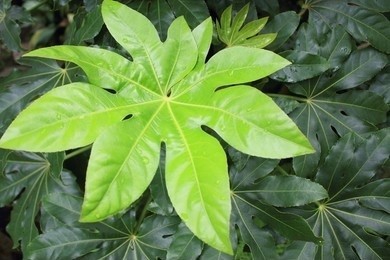Aralia Plant Tissue Culture
Araliaceae family Aralia plants, there are more than 40 species worldwide, most of which are distributed in Asia and North America.
 Bright green leaves of Aralia plant
Bright green leaves of Aralia plant
Aralia plants are a promising "treasure trove" that
can be tapped with the "spade" of tissue culture.
The buds and young leaves of some Aralia plants are rich in protein, amino acids, vitamins, crude fiber, and carotene, which are high-grade mountain wild vegetables.
The roots, stems, and leaves of many Aralia plants can also be used as medicine to strengthen the essence and nourish the kidneys, dispel rheumatism, invigorate blood circulation and disperse blood stasis, relieve pain, and analgesia, and strengthen the stomach.
At the same time, its flowers and fruits are beautiful autumn leaves, which is a very good prospect for the development and use of landscaping plants.
Tissue culture service
Aralia plants have high medicinal, nutritional, health care, and landscaping values, and have broad prospects for development and utilization, but the industrial development of Aralia plant resources is still in the initial stage due to the limitation of wild resources.
Most Aralia plants have small seeds, which are difficult to breed due to the limitations of seedling technology and management methods. Lifeasible provides Aralia plant tissue culture technology service, which makes Aralia plant resources seedling breeding with the advantages of fast propagation, annual production, and good product consistency.
The explants we use in Aralia plant tissue culture are mainly nutrient organs, including leaves, petioles, young stems, buds (terminal buds, axillary buds, dormant buds), cotyledons, young seeds, etc.
In the starter culture of Aralia plants, different species, types of explants and the types and concentrations of plant hormones in the culture medium have a great impact on the starter culture. We may use different concentrations of 2,4-D, NAA, IBA and IAA, etc. Of course, you don't need to worry about these because we have a mature system in these steps.
New method
We have increased the development of key technologies for artificial seed production such as somatic embryo synchronization occurrence and somatic embryo embedding in Aralia plant tissue culture.
Artificial seeds are produced from plant isolated the somatic embryo produced in culture or the meristematic tissue (bud, healing tissue, embryo body, etc.) that can develop into a complete plant is embedded in a shell containing nutrients and having a protective function, and a granule that can germinate and emerge under suitable conditions.
It has the advantages of fixing hybrid advantage, shortening breeding cycle, reducing cultivation cost, easy transportation, easy mechanization, and production independent of external environmental conditions.
You want to sign a confidentiality agreement.
You have a specific plant species for your experimental needs.
You have a reliable and relevant cooperation project to discuss.
You are very interested in our project or have any questions.
You need an updated and detailed quotation.
For research or industrial use.

 Bright green leaves of Aralia plant
Bright green leaves of Aralia plant
